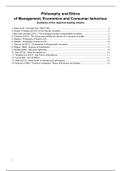Philosophy and Ethics
of Management, Economics and Consumer behaviour
Summary of the required reading articles
1. Adam smith - Excerpts from TMS & WN....................................................................................................... 2
2. Arendt - Prologue and Ch1 of The Human Condition....................................................................................3
3. Blok and Lemmers (2015) - The emerging concept of responsible innovation.............................................3
4. Friedman (1970) - The social responsibility of business is to increase its profits..........................................4
5. Okasha - Philosophy of Science Ch1............................................................................................................ 5
6. Okasha - Philosophy of Science Ch5............................................................................................................ 6
7. Owen et al (2013) - A framework for Responsible Innovation.......................................................................7
8. Popper (1963) - Science as Falsification...................................................................................................... 8
9. Sandel (2009) - Doing the right thing............................................................................................................ 8
10. Satz (2010) - What do markets do............................................................................................................ 10
11. Tempels et al (2017) - Big Food’s Ambivalence........................................................................................11
12. Van de Belt - Intro to Ethics...................................................................................................................... 11
13. Wells (2013) - Adam Smith on Morality and self-interest..........................................................................12
14. Swanson (1999) - Toward an integrative Theory of Business and Society...............................................13
1
, 1. Adam smith - Excerpts from TMS & WN
Adam Smith
Smith (economic philosopher) showed that this vast ‘mercantilist’ edifice was folly. He argued that in a free
exchange, both sides became better off. Quite simply, nobody would trade if they expected to lose from it.
The buyer profits, just as the seller does. Imports are just as valuable to us as our exports are to others.
Smith had a radical, fresh understanding of how human societies actually work. He realised that social
harmony would emerge naturally as human beings struggled to find ways to live and work with each other.
Freedom and self-interest need not produce chaos, but (as if guided by an ‘invisible hand’) order and
concord.
Smith looks to social psychology to discover the foundation of human morality. Human beings have a natural
‘sympathy’ for others. That enables them to understand how to moderate their behaviour and preserve
harmony. And this is the basis of our moral ideas and moral actions.
Human nature is complex. We are self-interested, but we also like to help others too. Smith shows how self-
interested human beings can live together peacefully (in the moral sphere) and productively (in the
economic). Self-interest may drive the economy, but that is a force for good – provided there is genuinely
open competition and no coercion. And it is the poor that economic and social freedom benefits most.
The Theory of Moral Sentiments
Sympathy is our fellow-feeling with any passion whatever. Sympathy arises not so much from viewing a
certain passion, but from the situation which excites it.
The theory of moral sentiments shows that our moral ideas and actions are a product of our very nature as
social creatures. It argues that this social psychology is a better guide to moral action than is reason. It
identifies the basic rules of prudence and justice that are needed for society to survive, and explains the
additional, beneficent, actions that enable it to flourish.
- Self-interest and sympathy. As individuals, we have a natural tendency to look after ourselves. That is
merely prudence. And yet as social creatures, explains Smith, we are also endowed with a natural
sympathy (today we would say empathy) towards others. When we see others distressed or happy, we
feel for them albeit less strongly. Likewise, others seek our empathy and feel for us. When their feelings
are particularly strong, empathy prompts them to restrain their emotions so as to bring them into line with
our, less intense reactions. Gradually, as we grow from childhood to adulthood, we each learn what is and
is not acceptable to other people. Morality stems from our social nature.
- Justice and beneficence. So does justice. Though we are self-interested, we again have to work out how
to live alongside others without doing them harm. That is an essential minimum for the survival of society.
If people go further and do positive good (beneficence) we welcome it but cannot demand such action as
we demand justice.
- Virtue. Prudence, justice, and beneficence are important. However, the ideal must be that any impartial
person, real or imaginary (what Smith calls an impartial spectator) would fully empathise with our
emotions and actions. That requires self-command, and in this lies true virtue.
Wealth of Nations
The division of labour, which gives rise to general opulence, is not the effect of human wisdom or intention,
but the consequence of the propensity to truck, barter, and exchange one thing for another.
A central theme is that this productive capacity rests on the division of labour and the accumulation of capital
that it makes possible. Huge efficiencies can be gained by breaking production down into many small tasks,
each undertaken by specialist hands. This leaves producers with a surplus that they can exchange with
others or use to invest in new and even more efficient labour-saving machinery.
2





